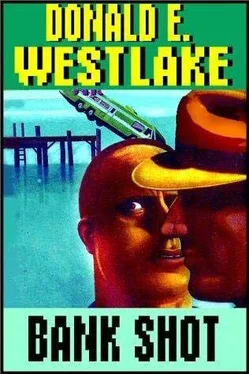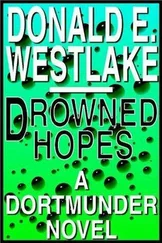Dortmunder looked at him again.
“No, I mean it,” Kelp said. “Usually you get this kind of a rain on a Sunday.”
Dortmunder said, “Are the five minutes up?”
“One minute to go. Keep looking for a place.”
“Sure,” Dortmunder said and looked out the windshield again.
The only good thing was the absence of cops. They’d seen a couple of patrol cars, but no more than normal; the search was obviously being hampered by the rain.
It seemed to Dortmunder, sitting there in the stolen station wagon while Kelp optimistically dragged him around through all this rain on a wild goose chase, that this was the story of his life. His luck was never all good, but it was never all bad either. It was a nice combination of the two, balanced so exactly that they canceled each other out. The same rain that washed away the green paint also loused up the police search. They stole the bank, but they couldn’t get into the safe. On and on.
Dortmunder sighed and looked at his watch. “Your minute is up,” he said.
Reluctantly, Kelp said, “Okay, I guess so.” Then he said, “I’ll take a swing around and head back that way.”
“Go straight back,” Dortmunder said.
“I don’t want to go back the same roads. What’s the point of that?”
“What’s the point of the whole thing?”
“You’re just depressed,” Kelp said. “I’ll turn right at that light up there and swing back that way.”
Dortmunder was about to tell him to make a U-turn, but memories arose and he changed his mind. “Just so we’re back by nine-thirty,” he said, though he knew they wouldn’t be.
“Oh, sure,” Kelp said. “Definitely.”
Dortmunder slumped in the corner and fantasized a return to the trailer in which May would meet him at the door by saying, “Herman opened it!” Then Herman would appear, smiling, holding handfuls of money. “Well, I got it,” he’d say. Murch’s Mom would be seen kicking her neck brace into the rain, shouting, “We don’t need that lawsuit money any more!” Victor would stand in the background, smiling, as though waiting his turn to come forward and recite “The Boy Stood on the Burning Deck.”
Kelp slammed on the brakes, and the station wagon skidded dangerously to the right. Dortmunder, jolted out of his daydream and practically into the glove compartment, shouted, “Hey! Hey, watch it!” He stared out front, and there was nothing in front of them; just the top of a hill they’d been driving up, a long gradual slope with nothing at the top, no reason at all for Kelp to slam his brakes on that way.
“Look at that!” Kelp shouted and pointed at nothing.
But Dortmunder looked instead out the rear window, saying, “You want another rear-end collision? That’s your trademark? What the hell are you doing?”
“All right, I’ll drive off the road. But will you take a look at that?”
Kelp drove the station wagon onto a gravel parking lot, and Dortmunder at last looked at what he was so excited about. “I see it,” he said. “So what?”
“Don’t you get it?”
“No.”
Kelp pointed again. “We put the trailer right there ,” he said. “See what I mean?”
Dortmunder stared. “Well, God damn it,” he said.
“It’ll work,” Kelp said.
Dortmunder couldn’t help it; against his better judgment, he was smiling. “Son of a bitch,” he said.
“That’s right,” said Kelp. “That’s absolutely right.”
“I hate rain,” Captain Deemer said.
“Yes, sir,” said Lieutenant Hepplewhite.
“I always have hated rain,” Captain Deemer said. “But never as much as today.”
The two officers were in the back seat of the patrol car the captain was using as his mobile headquarters during the search for the elusive bank. In the front were two uniformed patrolmen, the driver on the left and a man to operate the radio on the right. The radio was the contact not only with the precinct but also with other cars and with other organizations engaged in the bank hunt. Unfortunately, what the radio was mostly contacting was static, a fuzzing and bussing and crackling that filled the car like the aural expression of the captain’s nervous system.
The captain leaned forward, resting one heavy hand on the seat-back near the driver’s head. “Can’t you do anything with that goddam radio?”
“It’s the rain, sir,” the radio man said. “The weather is doing this.”
“I know goddam well the goddam weather is doing it,” the captain said. “I asked you can’t you do anything about it.”
“Well, we get pretty good reception when we’re on a hill,” the radio man said. “Driving along the flat, though, all I get is this static.”
“I hear it,” the captain said. He poked the driver on the shoulder and said, “Find me a hill.”
“Yes, sir.”
The captain leaned back and brooded at Lieutenant Hepplewhite. “A hill,” he said, as though hills were in themselves an insult.
“Yes, sir.”
“A mobile headquarters, and I can’t contact anybody unless I stand still on a hilltop. You call that mobile?”
Lieutenant Hepplewhite looked tortured as he tried to figure out whether the proper response was yes, sir or no, sir.
Neither was needed. Captain Deemer faced front again and said, “You found a hill yet?”
“I believe there’s one up ahead, sir,” said the driver. “Hard to tell in this rain.”
“I hate rain,” said the captain. He glowered out at it, and no one spoke as the mobile headquarters started up the long gradient of the hill. The radio spackled and fizzed, the windshield wipers swish-clicked, the rain drummed on the car top, and the captain’s right eyelid fluttered soundlessly.
“Shall I pull in by the diner, sir?”
The captain stared at the back of the driver’s head and considered leaning forward and biting him through the neck. “Yes,” he said.
“I guess the insurance company paid off,” the radio man said.
The captain frowned. “What are you talking about?”
“The diner, sir,” the radio man said. “They had a bad fire last year, burned to the ground.”
“Well, it’s back now,” Lieutenant Hepplewhite said.
“Doesn’t look open,” the radio man said.
The captain wasn’t feeling kindly toward irrelevancies. “We’re not here to talk about the diner,” he said. “We’re here to contact headquarters.”
“Yes, sir,” everybody said.
The diner was set back from the road, fronted by a gravel parking lot, with a large sign out by the road, reading, MCKAY’S DINER. The driver parked near this sign, and the radio man went to work on contacting headquarters. After a minute, the static receded and a tinny voice was heard, as though they’d reached somebody who lived in an empty dog-food can. “I’ve got headquarters,” the radio man said.
“Good,” said the captain. “Tell them where we are. Where the hell are we?”
“McKay’s Diner, sir.”
The captain lowered his head, as though he might charge. “When I say where are we,” he said, “I do not want an answer I can read off a sign right outside the goddam window. When I say where are we, I want to know —”
“Near Sagaponack, sir,” the radio man said.
“Near Sagaponack.”
“Yes, sir.”
“Tell headquarters that.”
“Yes, sir.”
“Find out what’s going on, if anything.”
“Yes, sir.”
“Tell them we’ll be here until further notice.”
“Yes, sir.”
“Until the bank is found, or the rain stops, or I go berserk.”
The radio man blinked. “Yes, sir,” he said.
“Whichever comes first.”
“Yes, sir.”
Читать дальше












